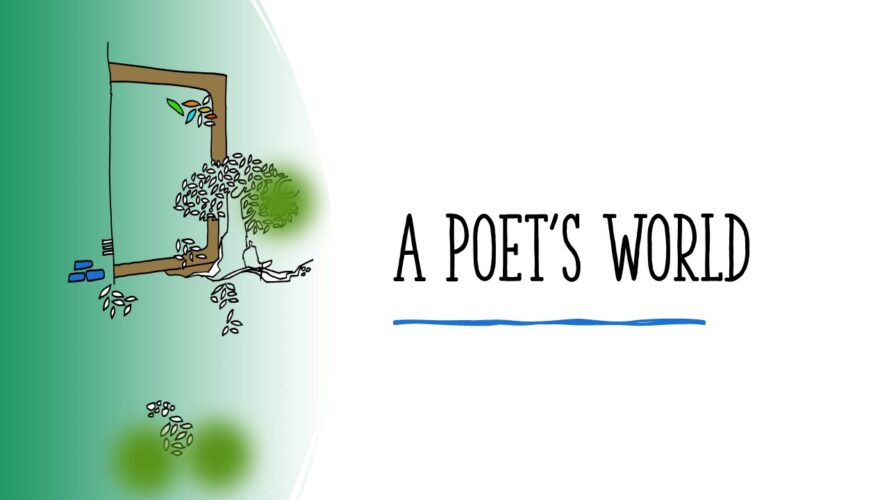 When did you first write a poem? Can you recall a specific moment from the experience?
When did you first write a poem? Can you recall a specific moment from the experience?I must wait for a poem
 When did you first write a poem? Can you recall a specific moment from the experience?
When did you first write a poem? Can you recall a specific moment from the experience?I remember writing my first full-length poem at the age of ten. I was in class five and had acquired, by then, some kind of flair for prose which had begun to be acknowledged by teachers and friends but I had never written poetry. In fact, I had never even believed it was possible to write a poem and so when a whole poem came unannounced to me one fine day, I was taken aback.
I vividly remember a new floral letter-pad that my mother had received as a gift for Teacher’s Day and which she offered to me for anything that I might wish to write on it. It was so pretty that I was convinced I couldn’t use it for writing ordinary things. I had to produce something special, something that was worthy of those beautiful pages. And it is out of that desire, I think, that my first poem might have arrived.
It was a descriptive piece about a dog which I had never had and owed itself largely to dogs like Timothy and Scamper in Blyton’s books that I read far more intensely than anything else in those days. Not sure of what title to give the poem, I called it ‘My Pet’.
It was as juvenile a piece as any other but I was rather proud of my feat. I must have either written or completed this piece in school during recess for I remember my excitement to return home that day and show it to my father who was very fond of poetry and would, in our load-shedding-marked evenings, recite countless Bengali poems to me from memory.
Naturally, the poem made my father very happy and he lavished on me all the warm appreciation for it that was necessary to make an uncertain young poet’s heart bloom with joy. I think I did not write my second poem until after another two years but the sense of wonder that my first poem gave me, has always remained.
Tell us about your journey till now, how has your writing style evolved over time?
I began with being a hesitant poet, uncertain of whether I should or could write. For most part, I was writing because I had to write. There was no escape, at times, from what was gnawing within me, restless to come out. In what was coming out in those exercises, there was little art. It was partly ugly and partly perilous like the fountain in Coleridge’s ‘Kubla Khan’ that exposed the “earth in fast thick pants (were) breathing”–a revelation, even to me, of my own tumultuous thoughts. This, I realised, I could not let pass as poetry. Primarily because here was too much of me that I did not want to give anyone access to. If I felt so vulnerable in writing, would there be a point in wanting to be a poet? Another consideration was why would anyone at all be interested in what I was going through?
Much of my journey as a poet has involved finding answers to these two questions.
I have three published collections of poems now, with the fourth arriving this year end. With every collection, I have tried to deal with these questions differently, and to establish the relationship between the personal and the political through a new poetic equation.
For me, to be a poet is to constantly agonize over language, to find the right language for a particular fact or sentiment, a language that will both stand still and flow, a language that will be mine as well as every reader’s who chooses to embrace it.
Can you name a recurring image or metaphor in your work, and explain its significance?
In so far as I can, I try not to be repetitive in my work but certain images tend to recur. Water, for instance, finds ways to appear in my poems quite often. As one of the five component-elements of the universe, I find water to be strongly feminine, both in its capacity to nourish and destroy. Both the dependability and deception of water fascinate me as well as its immense capacity to assimilate and accommodate. As a piscean, I have always been drawn to water but with every passing year, I find this relationship with water growing stronger and more meaningful. Logically, it has come to mark my poetry with greater philosophical clarity.
In the cosmos of my forthcoming collection, ‘A Blur of a Woman’, water predominates in all its chaos. The blur is its playfulness and its rage, its agony and jouissance.
What’s your writing routine, ritual or process?
I am tempted to answer that I have no routine or ritual whatsoever but I realise that even the not having of a ritual is its own kind of ritual.
I can never write a poem on command or demand, even my own. I must wait for it. Often months pass without its arrival. If the path were known, one would walk half-way to look for it but no one knows the way through which a poem comes. I keep all doors and windows of the mind and heart open. There was a phase in my life when a prolonged absence of poetry on my blank page would bode finality for me. Every few months, I would tell myself, “There! My days as a poet are over! Nothing will come anymore!” But my spells of despondency have declined over the years. I now know that poems will come at their own pace and time.
When a poem comes, my first job is to get it down on paper–real or virtual. For me, this is akin to being granted ample fabric for a dress I will soon make. This is the stage when I do not interfere with what comes. I let all of it pour as it wants to. From this raw material, over time (weeks/months/years), a poem will be shaped.
The best way to wait for poems is to read when one is not writing. Reading keeps the mind’s soil aerated and the perception supple. If I have no compulsion to read a certain book for academic or review purposes, I let books choose me. I walk to my shelf, close my eyes, and pick up a book. Sometimes, even within a book of poems, I close my eyes and open a certain page and begin my reading from there. I find this faith in chance very rewarding, a kind of invitation to the universe to work what magic it has.
How do you see yourself in the intersection of the world we live in and the poems you write in your solitude? Do you think poetry has the power to influence social change?
In even the starkest of solitude, the world is always present. For me, there is no way to dismiss it except wilfully and that kind of dismissal too, requires confrontation with the world.
I think poetry is an important space where I negotiate between the world and myself and decide what and how much of it requires my attention or dismissal. The process of negotiation is neither easy nor always successful but that agonizing is the poet’s task, both ordained and chosen.
There are many things on a day-to-day basis that reading and writing poetry clarify for me. All these clarifications are provisional but then, what is not? In fact, it is the provisionality of poetry that makes it very therapeutic for me to engage with the genre. There are poems I turn to in a particular frame of mind with the surety that they will give me what I need most at such a time. I have poems and poets that I turn to for courage, for healing, for inspiration, for hope. Also, for nostalgia, pain, and despair. With poetry, I am always well-armed and well equipped.
And yes, poetry is intensely capable of spearheading and shaping social change, as capable of destruction as it is of architecture. When the wind is favourable, it catches on like fire. Good poetry never stays put. It is always working on someone, somewhere to give back what has been taken away, to absorb what is no longer needed.
*









Add comment